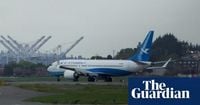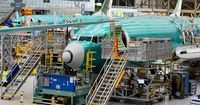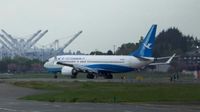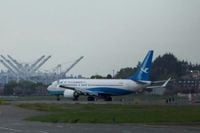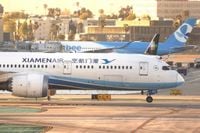A Boeing 737 MAX plane, intended for China’s Xiamen Airlines, landed back at Seattle's Boeing Field on April 20, 2025, at 6:11 p.m., becoming another casualty of the escalating trade war initiated by former President Donald Trump. This aircraft, adorned with the livery of Xiamen Airlines, was part of a group of jets that had been waiting at Boeing's Zhoushan completion center in China for final work and delivery.
The jet's return journey, which spanned approximately 5,000 miles, included refueling stops in Guam and Hawaii. This incident highlights the significant impact of the tit-for-tat tariffs imposed by the U.S. and China, which have disrupted the aerospace industry and strained international trade relations.
In a move that has rattled the aviation sector, Trump raised baseline tariffs on Chinese imports to a staggering 145% earlier this month. In retaliation, China responded with a 125% tariff on U.S. goods. This escalation has left many Chinese airlines reconsidering their aircraft deliveries from Boeing, as the financial burden of these tariffs could cripple their operations.
According to IBA, an aviation consultancy, the market value of a new 737 MAX is around $55 million. Given this high cost, Chinese airlines taking delivery of Boeing jets are now faced with the prospect of exorbitant tariffs that could significantly impact their profitability. The uncertainty surrounding these tariffs has led to confusion within the industry, with some airline CEOs indicating they may defer aircraft deliveries to avoid incurring additional costs.
The return of the 737 MAX is not an isolated incident. Reports indicate that a second Boeing 737 MAX 8 jet, also intended for a Chinese airline, was on its way back to the U.S. as of April 21, 2025. This aircraft had also departed from the Zhoushan completion center, further illustrating the ongoing turmoil in aircraft deliveries.
As the trade war continues, Boeing has been struggling to recover from an almost five-year import freeze on its 737 MAX jets, which had previously been grounded due to safety concerns. The recent tariff hikes and the resulting trade tensions have only compounded the difficulties faced by the company.
Beijing has reportedly asked Chinese airlines to pause any purchases of aircraft-related components and equipment from U.S. manufacturers, including Boeing, further complicating the situation. Approximately 10 737 MAX aircraft were scheduled to enter operation with Chinese airlines, including two specifically for Xiamen Airlines.
In a statement, Trump criticized China for reneging on the Boeing deal, asserting that they would 'not take possession' of aircraft they had previously committed to purchasing. This sentiment reflects the broader frustrations felt by U.S. officials regarding China's trade practices.
China's Commerce Ministry has urged the U.S. to cease its 'maximum-pressure tactics' and to engage in dialogue based on mutual respect. The ongoing trade dispute has drawn complaints from Beijing to the World Trade Organization (WTO), indicating the severity of the situation.
As the trade war unfolds, the implications for Boeing and the broader aerospace industry remain uncertain. Industry analysts warn that the confusion surrounding changing tariffs could leave many aircraft deliveries in limbo, with potential long-term consequences for manufacturers and airlines alike.
Some airline executives have expressed concern over the tariffs, stating that they might delay their aircraft deliveries in hopes that the situation will stabilize. Michael O’Leary, the CEO of Ryanair, recently indicated that the airline was scheduled to receive 25 Boeing aircraft starting in August but might postpone those deliveries due to the tariff situation.
Overall, the return of the Boeing 737 MAX jets from China serves as a stark reminder of the far-reaching effects of the trade war between the U.S. and China. As both nations navigate these turbulent waters, the aerospace industry is left to grapple with the fallout from these escalating tariffs and the uncertainty they bring.
In conclusion, the situation remains fluid, and both Boeing and its Chinese partners are likely to face further challenges as they seek to adapt to the changing landscape of international trade.
